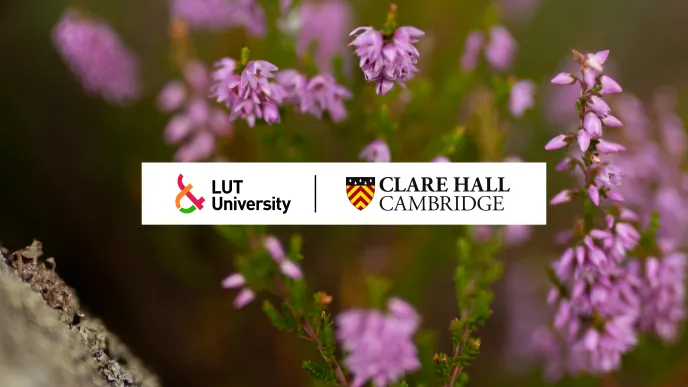Hannele Seeck

Esittely
Professor Seeck has published about 100 academic and professional publications. She leads the Disinformation, Propaganda & Soft Power Research Lab
Main position:
Professor (full, tenured) of Communication Sciences, Department of Social Sciences, School of Engineering Sciences, LUT University, Finland.
Honorary appointments and other current positions (selected):
Visiting Professor, The Department of Media and Communications, The London School of Economics and Political Science (LSE).
Research Fellow (Honorary Appointment), Judge Business School, University of Cambridge.
Life Member, Clare Hall College, University of Cambridge.
JSPS Invited Fellow, Waseda University, Tokyo, Japan.
Adjunct Professor (lifelong), Faculty of Social Sciences, University of Helsinki.
Adjunct Professor, National Defence University (National Defence Academy), Finland.
Vice Chair, Scientific Advisory Board for Defence.
Preferred contact information: hannele.seeck@lut.fi, Tel: +358-(0)46-8510784. Please contact by email primarily.
Expertise: Organisational communications; Crisis communications; Climate change communications, Global communications; Soft Power; Ideology; Discourse; Propaganda; Foucault; Governmentality; Critical Management Studies. Current interests: Ideology, propaganda & AI; Democracy, news & AI; Soft power & East Asian popular culture (TV dramas, films, and music) & climate change.
Biography: Professor Seeck has published about 100 academic and professional publications on organisational studies, media and communications and critical management studies. She has authored several books. Her recent publications include contributions to Organization, Media, Culture & Society, Management Learning and IJMR. Please see a list of publications for more information.
The research conducted, for example, at University of Cambridge, LSE and LUT—which is global, interdisciplinary and critical with the profound aim of making the world a better place to live—has always been vital to Professor Seeck because those are her underlying reasons for conducting research and being an academic in the first place.
The UK university system, particularly the London School of Economics and Political Science (LSE), has greatly influenced Prof. Seeck’s intellectual history. She completed her MSc, PhD and postdoc at The London School of Economics in the Department of Psychological and Behavioural Science and has previously served as a Senior Visiting Fellow (2010–2015) in the Department of Media and Communications, where she is currently a Visiting Professor. She is also a Research Fellow (Honorary Appointment), Judge Business School, University of Cambridge and a Visiting Fellow at Clare Hall College, University of Cambridge
In terms of positions of trust and societal impact, she has led several research projects, for example, for major global corporations and for the Prime Minister’s office. She led the well recognised investigation commissioned by the Prime Minister’s office of management and communication in Finland of responses to the Asian tsunami disaster. She is familiar with both private and public sector research and practice. For a number of years, she was a fellow of the Finnish Business and Policy Forum (EVA), the main business think-tank in Finland. She is also a member of the Boardman Management Study Group. She is Vice-Chair of the Scientific Advisory Board for National Defence.
Prior becoming a Professor in Communication Sciences at the School of Engineering, she was a Professor of Management and Organising (tenured) at the School of Economics, for number of years, Thus, her research is deeply interdisciplinary, combining for example, social theory, political science, history and management and organisational studies with media and communication studies and more recently, also with computational methods. However, in terms of theory building, her research often has a sociological twist. Prof. Seeck’s work reflects her interest in soft power, power relations and control mechanisms in the workplace and society at large, their historical development, new forms of materialisation and their interplay with subjectivity. Her research focuses on the global and local travel of ideas, ideologies and discourses, as well as on agency, power and governance.
In her current research on ideology and propaganda (joint research with LSE, Waseda, Cambridge and DPS-Lab colleagues), Prof. Seeck focuses on theories of ideology and propaganda and their different functions as well as on the study of longer-term ideological influence. The interest is in ideological propaganda particularly in the context of AI, as AI systems need to be able to recognise and detect different forms of propaganda and ideological propaganda.
She is an active member of many international organisations of the field, such as ICA and has been an active member of the Academy of Management since 2004. In recent years, her papers (with coauthors) have also been nominated by different academic divisions many times for the prestigious Carolyn Dexter Best International Paper Award, and her paper (with coauthors) also won the John F. Mee Award in 2021. She has also received recognition from journals; for example, her coauthored paper was previously recognised as the most cited article in Organization for the past three years. She has gained research funding, mostly from the Academy of Finland and several trusts and foundations. She is also a regular reviewer for many journals of the field and serves, for example, in the Editorial Advisory Board of Management Decision. She has administrative experience as Chair/Head of Subject, Principal Investigator and Team Leader.
She has wide-ranging pedagogic training, including recent training in neuroscience and learning. She has previous formal pedagogic training from the LSE (Teacher Accreditation Programme) and the University of Helsinki (65 ECTS, 2019–2021). She has taught extensively, totalling some 50 courses in English and Finnish. She has taught at all levels. She has also experience, for example, in curriculum planning at all levels. Her teaching competence in English has been formally assessed and was graded as excellent in her nomination to her previous and current positions. She believes that, in teaching, the most important thing is to guide learners to think for themselves. Her basic approach to teaching is a social constructionist one; that being said, on the broadest level, she believes that the students and the teacher develop together, shaping and modifying our understanding of the world around them. Her teaching practice is aimed at facilitating the acquisition of the transferable skills of analysing, criticising and synthesising theories and practices, developing the learners’ own argumentation and debate skills and questioning the prevailing paradigms. She firmly believes that these skills are both a prerequisite for excelling oneself and of great use in organisational and societal life.
For potential Doctoral Researchers/PhD candidates: If you are interested in conducting PhD at LUT in Communication Sciences, Department of Social Sciences, please contact me. Please note that the application period is continuous. However, please note that just during the past six months, I have received over 160 applications from potential PhD students.
I currently only take on new PhD students working within the following two broad themes:
- Ideology, propaganda, disinformation and other forms of soft power in the context of AI and quantum
- East Asian soft power and popular culture (TV dramas, films, and music) and climate change
For general PhD/doctoral studies related information please see: https://www.lut.fi/en/research/doctoral-school/doctoral-programme-engineering-science (then select social sciences).



